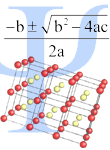Science tutor
Several options exist for science at GCSE, depending upon the school. GCSE Science and GCSE Additional Science cover Physics, Chemistry and Biology. Students may also take individual science subjects. For example single subject GCSE Chemistry incorporates all the Chemistry material in GCSE Science and Additional Science, together with extension modules.
I teach Chemistry and Physics for all of these GCSEs. I don’t teach Biology, though this typically seems to be the component of the Science and Additional Science GCSEs with which students have least difficulty.
Chemistry, along with Mathematics, is one of the most central of all the sciences. It impacts on subjects such as Physics, Biology, Materials Science, Pharmacy, Food Science and many more.
The jump from GCSE Science to A level Chemistry is considerable. This is due, in part to the inclusion, into the GCSE syllabus, of many topics which most chemists would consider to be aspects of Geography or Geology. The learning curve can be steep because, like Mathematics, Chemistry builds one concept on another. In contrast, with Physics, for example, one could be an expert in mechanics while being largely ignorant of the properties of light or electricity. Also, the symbols and terminology of Chemistry are very different from other subjects and are typically far from second nature at the start of an A level course.

